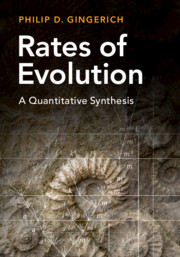Rates of Evolution
A Quantitative Synthesis
£75.99
- Author: Philip D. Gingerich, University of Michigan, Ann Arbor
- Date Published: May 2019
- availability: In stock
- format: Hardback
- isbn: 9781107167247
£
75.99
Hardback
Other available formats:
eBook
Looking for an inspection copy?
This title is not currently available on inspection
-
How fast is evolution, and why does it matter? The rate of evolution, and whether it is gradual or punctuated, is a hotly debated topic among biologists and paleontologists. This book compiles and compares examples of evolution from laboratory, field, and fossil record studies, analyzing them to extract their underlying rates. It concludes that while change is slow when averaged over many generations, on a generation-to-generation time scale, evolution is rapid. Chapters cover the history of evolutionary studies, from Lamarck and Darwin in the nineteenth century to the present day. An overview of the statistics of variation, dynamics of random walks, processes of natural selection and random drift, and effects of scale and time averaging are also provided, along with methods for the analysis of evolutionary time series. Containing case studies and worked examples, this book is ideal for advanced students and researchers in paleontology, biology, and anthropology.
Read more- Tables of evolutionary rates determined from experimental, field and fossil record studies are available online, together with an R script archive allowing readers to analyze rates
- Develops and explains methods for analyzing evolutionary time series to correct misconceptions about natural selection and random genetic drift
- Describes the ways to distinguish between directional, random, and stationary time series
Reviews & endorsements
'Philip D. Gingerich, renowned among paleontologists for his research on the evolution of mammals, has been a leading authority on rates of evolution for more than three decades. His analyses of evolution on different time scales have been critical to understanding this important, sometimes controversial, subject. Rates of Evolution: A Quantitative Synthesis will provide insights and statistical approaches that will interest a broad range of researchers and students working in evolutionary biology and paleontology.' Douglas Futuyma, State University of New York, Stony Brook
See more reviews'This book is a deeply thought-out, scholarly and lucid account of how to connect measurements of contemporary evolution with evolution as revealed in the fossil record. Rigorous and quantitative throughout, it will be a stimulating primer for professional evolutionary biologists. There is no other book like it.' Peter Grant, Princeton University, New Jersey
'Using evidence from many fields of biology, paleontology, and beyond, Gingerich's Rates of Evolution is a comprehensive synthesis of a pillar of the evolutionary paradigm. This book is a sophisticated analysis of quantitative empirical data integrated with evolutionary theory. It is destined to be an authoritative reference and much-cited classic in evolutionary biology.' Bruce MacFadden, Florida Museum of Natural History, University of Florida
Customer reviews
Not yet reviewed
Be the first to review
Review was not posted due to profanity
×Product details
- Date Published: May 2019
- format: Hardback
- isbn: 9781107167247
- length: 396 pages
- dimensions: 253 x 178 x 22 mm
- weight: 0.93kg
- contains: 96 b/w illus. 12 tables
- availability: In stock
Table of Contents
1. Introduction
2. Variation in nature
3. Evolutionary time
4. Random walks and Brownian diffusion
5. Temporal scaling and evolutionary mode
6. Directional selection, stabilizing selection, and random drift
7. Phenotypic change in experimental lineages
8. Phenotypic change documented in field studies
9. Phenotypic change in the fossil record
10. A quantitative synthesis
11. Retrospective on punctuated equilibria
12. Genetic models
13. Independent contrasts: Phylogeny's influence on phenotypes
14. Rate perspective on early bursts of evolution
15. Summary and conclusions
Appendix: generation times in bacteria, plants, and animals
References
Index.-
General Resources
Find resources associated with this title
Type Name Unlocked * Format Size Showing of
This title is supported by one or more locked resources. Access to locked resources is granted exclusively by Cambridge University Press to lecturers whose faculty status has been verified. To gain access to locked resources, lecturers should sign in to or register for a Cambridge user account.
Please use locked resources responsibly and exercise your professional discretion when choosing how you share these materials with your students. Other lecturers may wish to use locked resources for assessment purposes and their usefulness is undermined when the source files (for example, solution manuals or test banks) are shared online or via social networks.
Supplementary resources are subject to copyright. Lecturers are permitted to view, print or download these resources for use in their teaching, but may not change them or use them for commercial gain.
If you are having problems accessing these resources please contact [email protected].
Sorry, this resource is locked
Please register or sign in to request access. If you are having problems accessing these resources please email [email protected]
Register Sign in» Proceed
You are now leaving the Cambridge University Press website. Your eBook purchase and download will be completed by our partner www.ebooks.com. Please see the permission section of the www.ebooks.com catalogue page for details of the print & copy limits on our eBooks.
Continue ×Are you sure you want to delete your account?
This cannot be undone.
Thank you for your feedback which will help us improve our service.
If you requested a response, we will make sure to get back to you shortly.
×


